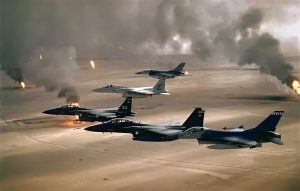
In the military sphere, there is a great deal of ribbing and catcalling, both between different services of a nation’s armed forces, but also between the forces of different countries. For the most part, this ribbing is good-natured fun, especially when it is based on actual reality.
However, there has been a highly toxic level of mocking applied to the armed forces of France, a situation that has been getting worse over the last forty years.
The jokes abound – the beret being designed to facilitate surrender by not getting in the way of raising one’s hands; the notion of French tanks having more reverse gears than forward one; the idea that French genes could not be improved after World War 1 because American troops widely used prophylactics; and the idea that French rifles are excellent as surplus…because they were “only dropped once“…something applied to the Army of South Vietnam, as well.
It’s one thing, to make these jokes in actual jest. It is another thing entirely, when they become statements. Then, it’s no longer funny, but suicidally insulting.
In fact, the French military has maintained a track record of success on the battlefield for centuries. The source of these juvenile statements of inability only date from the Franco-Prussian War, and its catastrophic cost to the country. The military’s troubles in World War 1 came from holding the Imperial German Army at bay for three years, at a cost of 1.4 million casualties.
While the disaster of the opening of World War 2 led to France’s conquest by Nazi Germany, France’s military plan was not a bad plan, just a plan poorly executed…and the British did not do very well, then, either. The collapse of France’s colonial empire after World War 2 did come from overly ambitious military plans formed by not understanding that colonial warfare had changed…something the United States also failed to grasp, in the exact same place as Dien Bien Phu, a decade prior.
The fact is that, for all of it’s messy problems in the last century, the French military remains one of the most capable armed forces on the planet – if their leaders allow their generals to do their jobs.
The French Army’s reputation for military professionalism, despite its dramatic fluctuations over the past two centuries, has created a complex narrative that defies simple description. From the revolutionary fervor of the Napoleonic era to the post-WW2 colonial campaigns and modern peacekeeping operations, France’s military has continually demonstrated both exceptional competence and notable – but recoverable – failures that continue to shape perceptions today.
The Napoleonic Foundation
The modern French Army’s professional identity was forged in the crucible of the Revolutionary and Napoleonic Wars (1792-1815). Napoleon’s Grande Armée established standards of tactical innovation, logistical organization, and battlefield leadership that influenced military thinking across Europe, down to today. The army’s meritocratic promotion system, revolutionary at the time, created a professional officer corps based on ability rather than aristocratic birth. This period saw the development of combined arms tactics, the corps system, and sophisticated staff work that demonstrated clear military professionalism.

However, even during this golden age, the French military exhibited characteristics that would later prove problematic. The cult of offensive action (offensive à outrance) and the emphasis on élan over methodical planning became deeply embedded in French military culture, later contributing to both spectacular victories and catastrophic defeats.
19th Century Trials and Adaptations
The Franco-Prussian War of 1870-71 exposed serious deficiencies in post-Napoleonic French military professionalism. Poor intelligence, inadequate logistics, and outdated tactical thinking led to decisive defeat and the collapse of the Second Empire. The subsequent creation of the Third Republic saw significant military reforms, including the establishment of improved staff colleges and the modernization of equipment and tactics.
The colonial period (1830s-1960s) presents a particularly complex chapter in French military professionalism. The conquest of Algeria, the expansion into West and Equatorial Africa, and campaigns in Indochina demonstrated considerable tactical adaptability and logistical capability over vast distances. French colonial forces also developed expertise in irregular warfare, cultural adaptation, and civil-military cooperation that proved valuable in diverse environments, although these advantages rarely translated into warfare on the European continent, which was common to all the major European powers.
Yet this same period saw the development of what critics term “colonial habits” – reliance on superior firepower against less-equipped opponents, acceptance of harsh methods, and a certain detachment from metropolitan oversight that would later create problems in conventional conflicts.
World War I: Staying Power
The Great War stretched French military professionalism to its limits. Initial disasters, including the failure of Plan XVII and massive casualties from adherence to offensive doctrine, gave way to remarkable adaptation under pressure. The French Army demonstrated institutional learning capacity, rapidly developing new tactics for trench warfare, integrating new technologies, and maintaining cohesion through four years of unprecedented carnage.

The performance of French commanders like Ferdinand Foch and Philippe Pétain, along with the army’s ability to absorb and integrate lessons from the battlefield, demonstrated core professional competencies. However, the trauma of the war also reinforced defensive thinking that would prove problematic in the next conflict.
1940: Collapse and Recovery
The defeat of 1940 represents perhaps the most significant challenge to claims of French military professionalism. Despite having numerically superior and often technically advanced equipment, the French Army was comprehensively outmaneuvered by German forces employing innovative combined arms tactics. Analysis reveals multiple professional failures: inadequate intelligence, poor communications, inflexible command structures, and outdated operational concepts.
Yet the same period saw examples of French military professionalism in different contexts. The Free French forces under Charles de Gaulle, though small, maintained military traditions and eventually contributed significantly to the liberation of France. The French Resistance, while not strictly military, demonstrated tactical innovation and operational security that impressed Allied observers.
Colonial Wars and Professional Dilemmas
The post-war colonial defeats in Indochina (1946-1954) and Algeria (1954-1962) present perhaps the most controversial chapters in assessing French military professionalism. In Indochina, French forces demonstrated remarkable tactical competence in difficult conditions, developing techniques counterinsurgency and showing considerable adaptability. However, strategic failures and political constraints ultimately led to defeat at Dien Bien Phu.
The Algerian War proved even more problematic. While French forces achieved significant tactical successes against the FLN, the conflict saw disturbing breakdowns in professional conduct, including widespread use of torture and involvement in attempted coups against the civilian government. The Battle of Algiers (1956-1957) exemplified this tension between tactical effectiveness and questionable methods.
Since 1962, the French Army has undergone a significant revamping of its professional nature. The end of conscription in 1996 created an all-volunteer force with higher educational standards and improved training. French forces have demonstrated competence in various international operations, from peacekeeping in the Balkans to counterterrorism operations in the Sahel region of Africa.
Operations like Serval (2013) and Barkhane (2014-2022) in Mali showcased French capabilities in rapid deployment, intelligence gathering, and coordination with international partners. These operations demonstrated institutional learning from previous colonial experiences while maintaining focus on legitimate military objectives.
And it is here, that a more detailed look at Operation Serval is instructive on just how adaptable French forces can be.
Strategic Challenges of Operation Serval (2013)
Operation Serval presented the French military with a complex array of strategic challenges that tested every aspect of modern expeditionary warfare capabilities. The intervention in the war in Mali, launched on January 11, 2013, required France to project power across 4,000 kilometers into the heart of the Sahel region under severe time constraints and with limited initial international support.
Geographical and Logistical Complexity
Mali’s vast territory — larger than France and Germany combined — posed immediate strategic challenges. The northern regions under jihadist control encompassed over 800,000 square kilometers of desert and semi-arid terrain with minimal infrastructure. French forces faced the fundamental problem of securing lines of communication across this enormous space while maintaining operational tempo against a mobile enemy well-adapted to the local environment.
The logistical challenge proved particularly acute given Mali’s landlocked position and limited transportation infrastructure. France had to establish supply chains through multiple African partners, primarily using bases in Ivory Coast, Chad, and Niger. The single major airfield at Bamako created a critical vulnerability, while the absence of reliable road networks forced heavy reliance on air transport for sustained operations. This logistical complexity demanded unprecedented coordination between French forces, African partners, and international allies.

Time Sensitivity and Strategic Surprise
Perhaps the most critical challenge was the compressed timeline. Intelligence indicated that jihadist forces were preparing to advance south toward Bamako, Mali’s capital, potentially within days of the French decision to intervene. This left no time for the deliberate planning and force buildup typical of major military operations. French planners had to balance the immediate need to halt jihadist momentum with the longer-term requirement to establish sustainable operations across northern Mali.
The rapid deployment requirement meant accepting significant strategic risks. Initial French forces numbered fewer than 1,000 troops — inadequate for controlling territory, but sufficient to provide a rapid response capability. This created a dangerous window where French forces operated with minimal reserves while still building combat power in theater.
Coalition Building Under Pressure
France faced the delicate challenge of building international legitimacy while maintaining operational flexibility. The African Union had authorized the African-led International Support Mission to Mali (AFISMA), but this force remained months from deployment. France needed to demonstrate that Serval was not another unilateral European intervention in Africa, while simultaneously retaining command authority essential for rapid operations.
The diplomatic challenge extended to securing overflight rights, basing agreements, and logistics support from multiple African and European partners. Each agreement required careful negotiation to balance French operational needs with partner nation sensitivities about sovereignty and post-colonial relationships.

Enemy Adaptation and Asymmetric Threats
The jihadist coalition in northern Mali presented a sophisticated opponent that combined conventional capabilities with insurgent tactics. Groups like AQIM (Al-Qaeda in the Islamic Maghreb) had years to prepare defensive positions and supply caches across the region. They possessed advanced weaponry captured from Libyan stockpiles, including anti-aircraft systems that threatened French air operations.
More challenging was the enemy’s ability to blend into local populations and exploit grievances against the Malian government. French forces had to distinguish between ideological jihadists and local groups with legitimate political grievances, while avoiding civilian casualties that could undermine popular support for the intervention.
Strategic Success Despite Constraints
Despite these formidable challenges, Operation Serval achieved its strategic objectives within weeks. French forces halted jihadist advances, secured major population centers, and degraded enemy capabilities sufficiently to allow AFISMA deployment. The operation demonstrated sophisticated understanding of modern warfare’s political dimensions—achieving military objectives while building conditions for successful transition to international peacekeeping forces.
The strategic challenges of Serval illustrate the complexity of contemporary expeditionary operations and highlight the French military’s capacity for rapid, effective intervention in challenging operational environments. This success provides compelling evidence of institutional competence that deserves recognition in serious strategic analysis.
Contemporary Assessment
Today’s French Army exhibits many characteristics of a professional military force: clear command structures, standardized training, integration with NATO allies, and adherence to international laws of war. However, debates continue about the persistence of certain cultural traits from earlier periods, particularly regarding operations in former colonial territories.
The French military’s professional reputation ultimately rests on its demonstrated capacity for adaptation, institutional learning, and technical competence across diverse operational environments. While historical controversies remain, the modern force has largely addressed the systemic issues that plagued earlier generations, creating a military organization that generally meets contemporary standards of professionalism.
Conclusion
The French military faces challenges, to be sure. But other, larger forces – usually with highly inflated perceptions of their own ability – face whose same challenges, as all armed forces try to navigate the swirling tempest of the emerging “One-N-Twenty“.
Don’t write off an army because of some bumps over the course of several centuries: You make mistakes, too.









